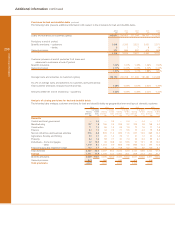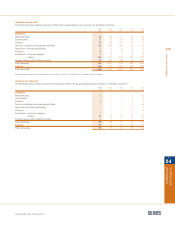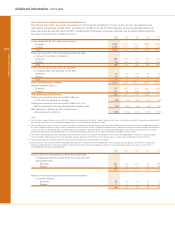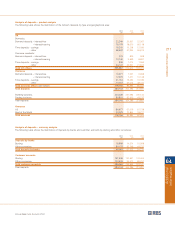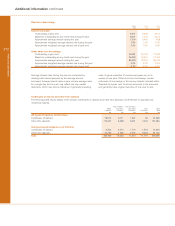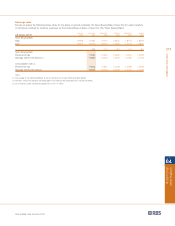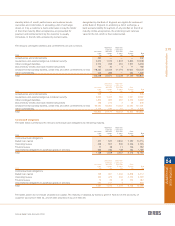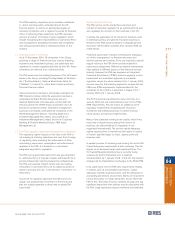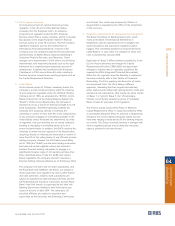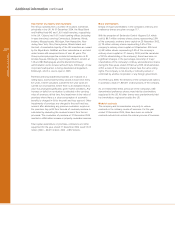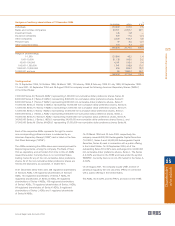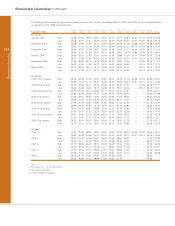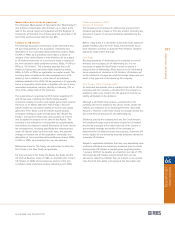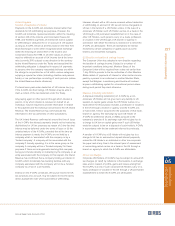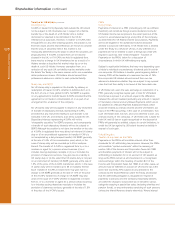RBS 2004 Annual Report Download - page 220
Download and view the complete annual report
Please find page 220 of the 2004 RBS annual report below. You can navigate through the pages in the report by either clicking on the pages listed below, or by using the keyword search tool below to find specific information within the annual report.
218
Additional information
Additional information continued
Supervision and regulation (continued)
As regards the insurance industry, the FSA’s primary
objective is to regulate and supervise the industry so that
policyholders have confidence that they have bought
appropriate products, that UK insurers are able to meet
their liabilities and that they treat customers fairly. The FSA
sets requirements relating to “margins of solvency” (i.e. the
excess of the value of assets over the amount of
liabilities). Companies carrying out insurance business
are required to submit regular returns covering reserves
and solvency to the FSA.
On 15 January 2005, the FSA commenced regulation of
the sale and administration of general insurance and
certain other types of insurance contracts.
Firms must also meet standards relating to senior
management and internal systems and controls and must
comply with rules designed to reduce the scope for firms
to be used for money laundering. Revised Joint Money
Laundering Steering Group Guidance Notes came into
force in 2004. The EU published its draft Third Money
Laundering Directive which aims to consolidate the two
previous Anti Money Laundering Directives.
Implementation is expected in 2006.
Conduct of business standards essentially govern key
aspects of firms’ relationships with customers, and require
the provision of clear and adequate information, the
managing of conflicts of interest and the recommending of
products suitable to the needs of customers. The
marketing of financial products (particularly investment
products) is subject to detailed requirements.
FSA rules relating to the provision of advice on
“packaged” products (i.e. personal pensions, life
assurance and collective investment schemes) were
changed on 1 December 2004. The previous rules
required businesses either to be independent or tied to
only one product provider. The FSA has now abolished
these rules. There is a six month transitional period for
firms to amend their documentation and processes. Firms
can continue to be independent or they can associate
themselves in a variety of ways with many product
providers. The changes are not expected to have any
significant impact on RBSG.
1.4 Focus on customers
An important element in securing an appropriate degree of
consumer protection is ensuring that suitable
arrangements are made for dealing with customer
complaints. Firms are required to establish appropriate
internal complaint handling procedures and to report
complaints statistics to the FSA. Where an issue cannot be
resolved by the parties it may be referred for independent
assessment to the Financial Ombudsman Service.
The FSA’s high level principles require all regulated firms to
treat their customers fairly. Since 2000 the FSA has
undertaken a number of industry wide thematic reviews on
this issue, and this activity will continue into 2005. The
FSA have indicated that they will include assessment of
firms’ effectiveness in this area in the firms’ ARROW
assessments from 2005.
The Financial Services Compensation Scheme (financed
by levies on authorised firms) is available to provide
compensation up to certain limits if a firm collapses owing
money to investors, depositors or policyholders.
1.5 Fraud
Towards the end of October 2004, the FSA launched its
new policy on combating fraud in the financial services
industry – Fighting Fraud in Partnership. The FSA is
working on a programme of activities focusing on (i)
actions that the FSA will take, (ii) FSA support for work by
trade associations and the industry, (iii) creating closer
relationships with law enforcement agencies and, (iv) the
Government making fraud a higher law enforcement
priority leading the development of a fraud strategy.
1.6 Enforcement
Where appropriate, the FSA may discipline and/or
prosecute for breaches of the legislative or regulatory
requirements. The FSA works closely with the criminal
authorities and uses both civil and criminal powers. It can
withdraw a firm’s authorisation, discipline firms and
individuals, prosecute for various offences and require
funds to be returned to customers.
The FSA also has powers under certain consumer
legislation to take action against authorised firms to
address unfair terms in financial services consumer
contracts.
1.7 Extension of the FSA’s responsibilities
From 31 October 2004, the scope of the FSA’s
responsibilities was widened to cover the regulation and
supervision of mortgage lending and administration and
the provision of mortgage advice. Arrangements relating to
the sale and administration of general insurance (and
certain other insurance) contracts became regulated from
15 January 2005. These activities are undertaken by
companies in the Group and this extension of the scope of
statutory regulation is likely to have a significant impact on
how the relevant businesses operate in the future.
1.8 Other relevant UK agencies and Government departments
Consumer credit issues are covered by the Department of
Trade and Industry (“DTI”) and the Office of Fair Trading
(“OFT”) and competition issues are dealt with by the OFT.
The business of granting consumer credit is heavily
regulated. Aspects of the consumer credit business are
under review, at both national and EU levels. Some
changes to UK legislation were implemented from October
2004 (primarily changes to advertising requirements), with
others coming into force in May 2005 and legislation to
further amend the UK regime scheduled for 2005. An EU
Consumer Credit Directive is also under negotiation.


